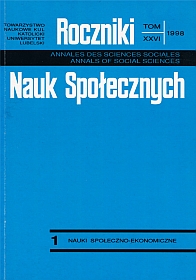The Operation of Symbol. Comments about the Conceptions of Pierre Bourdieu
Abstract
The conceptions of Pierre Bourdieu should be placed in the post-structuralist trend of the theory of discourse. He deals with the formation of social meanings in group conflicts for the control over meaning. Since he parts from the hitherto paradigms, some scholars think that the French sociologist's conceptions bear the traits of post-modernism. Bourdieu assumes that the „social nature” of language is one of its principal, internal characterizations. Therefore he rejects the autonomy of language and symbolism in general, including their analysis again within the social conditions of „production, reproduction and usage.” If a sign in the conception of de Saussure pertains to an informing communication and contains the signifying-signified structures, the symbol – apart from the level of understanding – contains also evaluation and authority. Therefore Bourdieu connects the symbolic dimension of culture with social actions and relations. Bourdieu, in comparison with pragmatism or Znaniecki's theory, has undoubtedly pushed to the foreground the problem of the symbolization policy. The symbolic power consists of establishing the gnosiological order - doxa, i.e. the acceptance of the immediate significance of the social world.
Copyright (c) 1998 Roczniki Nauk Społecznych

This work is licensed under a Creative Commons Attribution-NonCommercial-NoDerivatives 4.0 International License.


